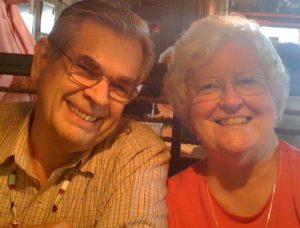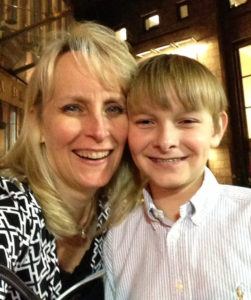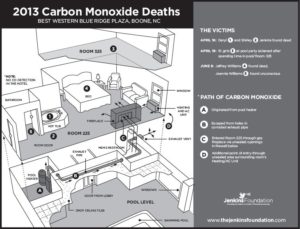Our Story
The Jenkins Foundation was formed in memory of Daryl and Shirley Jenkins who both lost their lives to carbon monoxide poisoning in a hotel room in Boone, North Carolina, on April 16, 2013. The carbon monoxide came from a corroded pool heater exhaust system located directly below their room. It was later learned the hotel had no carbon monoxide detection system installed. As a result, Daryl and Shirley had no alert to evacuate the room, the hotel staff had no way of knowing their guests were in life-threatening danger, and investigators did not immediately investigate CO as the cause of their deaths. Consequently, the tragedy did not end there...
Seven weeks later, 11-year-old Jeffrey Williams and his mother, Jeannie were checked into the same hotel room. The following morning both were found unconscious by hotel staff after having been exposed overnight to the high levels of CO that were still being discharged – undetected – into the room. Sadly, Jeffrey did not survive. Jeannie, in addition to losing her son, was left with long term physical effects related to extended exposure to high levels of CO.
At the hotel, it took the involvement of a HazMat Team to finally determine what a simple carbon monoxide alarm could have immediately alerted to, weeks earlier. What could and should have been only a simple building evacuation instead resulted in the loss of three innocent lives and permanent harm to a fourth.
Ironically, both Daryl and Shirley were well educated about the dangers of carbon monoxide. They had alarms in their home. Shirley had worked for a natural gas company for 30 years, keenly aware of the danger of carbon monoxide and the lifesaving value of carbon monoxide alarms.
What was the crucial piece of information they were missing? The fact that not all hotels in this country are required to have carbon monoxide detection systems, even if gas appliances are installed.
The deaths of Daryl and Shirley and 11-year-old Jeffrey Williams in the same hotel room just a few weeks later, have been collectively referred to by some as an anomaly, a tragic perfect storm of events that no one could have predicted or prevented. Regarding hotel carbon monoxide incidents in general, representatives of the hotel industry have been quoted as saying, “CO incidents are rare, so there’s no need for laws requiring hotels to have alarms. You have a better chance of being struck by lightning than being hit with CO poisoning.” https://www.usatoday.com/story/travel/hotels/2012/11/15/hotels-carbon-monoxide-alarms/1707863/
However, we learned otherwise. In 2007, the article “Carbon Monoxide Poisoning at Motels, Hotels, and Resorts,” by Dr. Lindell Weaver was published, documenting 68 incidents of carbon monoxide poisoning between 1989 and 2004 that resulted in deaths and injuries to hundreds of hotel guests in this country. Dr. Weaver gathered much of the data for this study by conducting online media searches because there’s no nationwide database of information to search. Incredibly, no federal agency tracks carbon monoxide poisoning incidents in hotels.
After finding Dr. Weaver’s study, we started compiling data about hotel carbon monoxide incidents ourselves. Researching one case led to finding another, and another, and so on. There were so many, we started a list. Dr. Weaver shared his list to compare with our list, and we combined the two lists to create a detailed spreadsheet of cases dating back more than 50 years for the purpose of bringing awareness to the urgent need for required carbon monoxide detection systems in ALL hotels. In the meantime, these incidents continue to happen with alarming regularity, both in the U.S. and abroad.
In 2019, using the data from our spreadsheet and data from their own medical practices, Dr. Weaver and Dr. Neil Hampson wrote a followup to Dr. Weaver’s original article. Carbon Monoxide Poisonings in Hotels and Motels: The Problem Silently Continues, was published in Preventive Medicine Reports and documents an additional 115 incidents of carbon monoxide poisoning between 2005 and 2018. The two studies together document almost 30 years (1989-2018) of carbon monoxide poisoning incidents in U.S. hotels.
In 2021, the data from our spreadsheet was compared to data collected by the U.S. Fire Administration (USFA) via the National Fire Incident Reporting System (NFIRS) which documents fire department response calls to hotel CO incidents in the U.S. The results from this comparison confirmed that there are far more carbon monoxide incidents occurring in hotels than are reported on in the media and that “lodging industry CO incidents occur at far greater rates than previously realized.” Analyzing the National Fire Incident Reporting System to Identify Carbon Monoxide Incidents in the U.S. Lodging Industry
As it turns out, being poisoned by carbon monoxide in a hotel is anything but rare. It has resulted in the very preventable deaths of hundreds of people and injury to thousands of others: business travelers, couples on vacation, honeymooners, college students making their way home for the holidays, pregnant women and their unborn babies, children. In some cases, entire families have died in their hotel room. In one case recently, a 13-year-old boy died on the deck of a hotel pool while attending a spring break pool party.
Until the lodging industry is required to have adequate carbon monoxide safeguards in place to protect their guests – including detection/alarm systems, mandatory staff training, emergency evacuation procedures – we encourage you to carry a carbon monoxide alarm when you travel. This information could have saved my parents’ lives. Please consider sharing it with your family and friends.
–Kris Hauschildt (daughter of Daryl and Shirley Jenkins and founder of the Jenkins Foundation)
For more information on how to stay safe from carbon monoxide when staying in hotels and vacation rentals, click here.
To read about the mission of the Jenkins Foundation, click here.
- Daryl and Shirley Jenkins
- Jeannie and Jeffrey Williams
To stay updated on CO safety and our activities, sign up for email updates and visit us on Facebook






